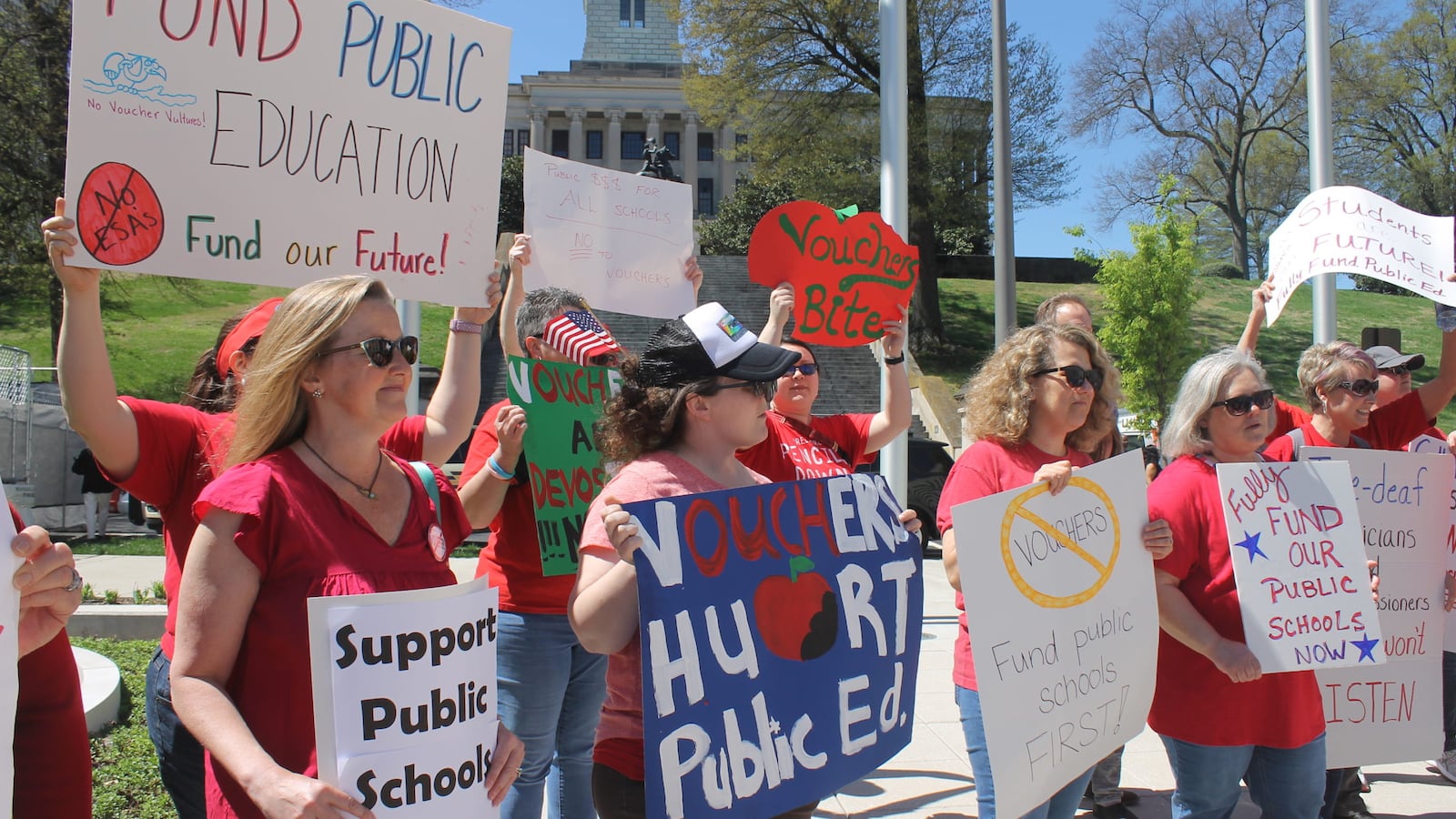Tennessee’s new education voucher law is facing a second legal challenge, this time with a lawsuit filed Monday on behalf of 11 public school parents and community members in Memphis and Nashville.
The lawsuit contends that diverting millions of dollars to private schools that were appropriated to public schools in Tennessee’s two largest cities violates the constitutional rights of public schoolchildren to receive an adequate and equitable education.
The suit also says the state Constitution prohibits the legislature from passing laws that apply only to certain counties — in this case, Davidson and Shelby Counties, whose elected local officials overwhelmingly opposed the 2019 voucher law that targeted only their communities.
Gov. Bill Lee’s education savings account program could siphon off more than $375 million from Shelby County Schools and Metropolitan Nashville Public Schools in its first five years, according to the 38-page suit.
“We love my daughter’s school, but it is already underfunded,” said Roxanne McEwen, whose child attends an elementary school in Nashville. “There isn’t enough money for textbooks, technology, to pay teachers, or to keep class sizes down. ”
Tracy O’Connor, whose four children attend Shelby County Schools in Memphis, said her family’s schools have not been able to provide her sons with all of the courses and certified teachers that they need due to a lack of resources.
“If the district loses more funds due to the voucher program, I worry that we will lose more guidance counselors, reading specialists and librarians, and there will be more cuts to the foreign language and STEM programs,” she said.
The litigation is the second in a month contesting the constitutionality of Tennessee’s controversial education savings account law, which allows qualifying families to use their state education dollars on private school tuition, tutoring, and other approved education-related expenses.
Both suits seek to strike down the law or, at the very least, temporarily block the state from launching the program next school year.
In February, the governments of Shelby County and Metropolitan Nashville joined Nashville’s school district to sue the state. They argue that the law “unilaterally and arbitrarily” targets their communities — and saddles them with an unfair financial burden.
A hearing in the first case is set for Friday before Davidson County Chancellor Anne C. Martin as several pro-voucher organizations seek to intervene.
All of the legal challenges come as Tennessee’s education department is fast-tracking development of the voucher program to launch this summer, a year earlier than required by the law. Soon after signing the bill, the Republican governor said that he wants to provide access as soon as possible to education savings accounts, which the House approved by a single vote last spring after similar voucher proposals failed to garner enough votes for more than a decade.
A spokeswoman for the state attorney general’s office had no comment Monday on the latest lawsuit.
Called McEwen v. Lee, the complaint was filed in a Nashville court by the Education Law Center and the Southern Poverty Law Center, collaborators in a national campaign that opposes private school vouchers and seeks to ensure that public funds are used exclusively to support and strengthen public schools. The plaintiffs are also represented by the American Civil Liberties Union of Tennessee and the Nashville law firm of Robbins Geller Rudman & Dowd LLP.
While using many of the same arguments as the first lawsuit, the second suit gives several new reasons that parents say the voucher law should be spiked.
The complaint says private schools will not have to adhere to the same academic, accountability, and governance standards as public schools, and will be able to discriminate against students on the basis of religious, disability, income level, sexual orientation, and other characteristics. Private schools also are not required to provide special education services to students with disabilities.
“I do not know of a single private school in the state that would be willing or able to enroll a student like my son,” said Terry Jo Bichell, whose youngest son was born with a genetic brain disorder and attends public schools in Nashville.
The complaint says the law also violates a constitutional requirement that the legislature appropriate first-year funding for each law it passes. Recent legislative hearings revealed that the education department has used funds from an unrelated program to pay over $1 million to a private company to help administer the education savings account program.
More legal challenges could come. Attorneys for Shelby County Schools said Monday that they support arguments made in the current suits and are exploring options for filing their own.
“The financial piece is the biggest [issue],” said Kenneth Walker, the district’s interim general counsel. “And you can imagine the impact on the district with respect to programs, staffing, employees, and the ongoing operations of our schools. We can talk for hours on what the adverse impact would be if this law were to remain in place.”
Chalkbeat reporter Laura Faith Kebede contributed to this report.

